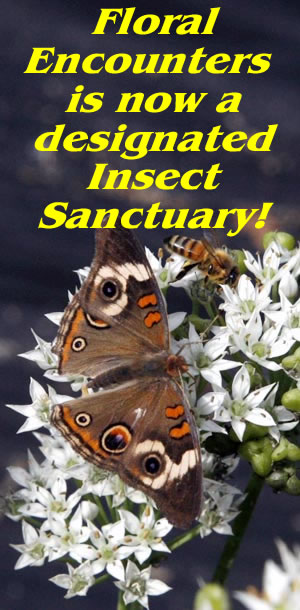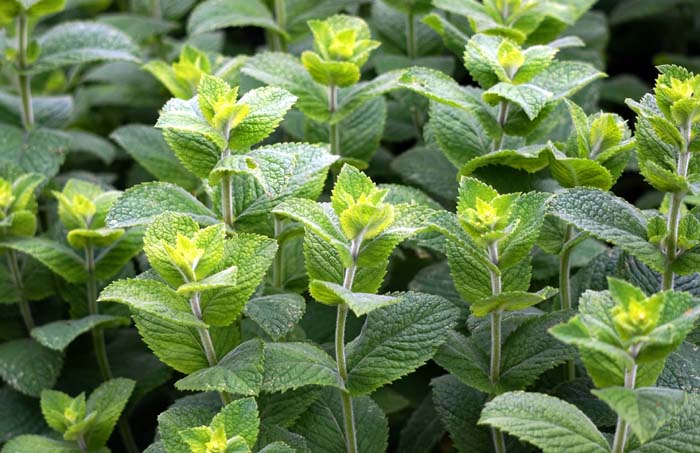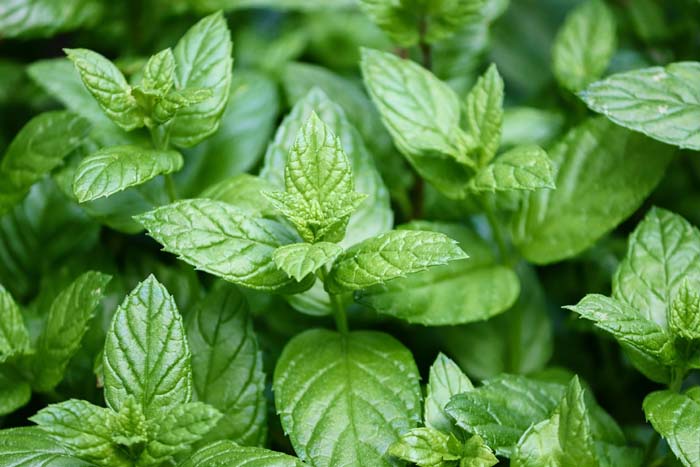No garden should be without one form of mint. Most mints are good ground cover plants and are excellent for areas that you really don't know what else to do with. Mint will die back to the ground in winter and re-sprout in spring. Once its growing it needs very little attention and is pretty hardy. It will spread however so make sure you don't grow it anywhere near other plants or it will smother them. Wildlife don't usually eat it but mints are excellent for the digestive system so it's a great herb to have on hand for stomach aches, overeating or just flavoring drinks on a warm summer afternoon. There is nothing like fresh mint.
Description of Peppermint (Mentha x piperita)
Mid to darker green leaves that are slightly ovalish lance shaped leaves up to 2 inches long (4cm) long with strong sharp toothed edges. Leaves are arranged in opposite pairs on a stout square shaped stem. Growing to about two feet in height they produce numerous whorls of flowers in slender spikes at the end of the stems in mid to late summer. Flowers are small tube shaped pale lavender to white in color. Although not very showy in their own right they can be quite noticeable en mass. They are beloved by butterflies and bees.
Growing Peppermint (Mentha x piperita) from seed.
Because of genetic diversity and a tendency for peppermint to hybridize with other plants in the same family the plants you raise will not be the same as the one the seed came from. Like many plants there will be a variety some will have a higher oil content than others and some will have a better flavor or scent. Plants may also have different growing styles, some compact and short others taller. See our article on
growing mint from seed.
The exciting thing about growing from seed is that you get to pick which plants you like the best and work with those (this is how breeders make new plant varieties). You can choose which ones you prefer the look of or which ones have the best taste and take cutting from these to increase your plant stock.
Growing from seed is easy. Seeds are very small but germinate quickly and seedlings grow quickly. We recommend starring seeds in trays and transplanting to individual pots to begin with. Then taste your plants and decide which ones you want to keep. See our general growing instructions for more details on growing seeds.
Location and Care of Peppermint (Mentha x piperita)
Peppermint likes sunlight. It can grow in partial shade but it tends to be lanky. However in areas where days are long and hot a little afternoon shade would be beneficial. Sunlight increases the production of the essential oils that give the plant it's wonderful smell and taste so if you intend to use it make sure it has plenty of light.
Peppermint is not fussy about soil type and will grow in almost anything provided its not waterlogged (but there is a mint that will grow there if you need it). While peppermint is fairly drought tolerant it will not produce a lot of leaves if it does not have a reasonable amount of water, so if you are growing with harvesting in mind then make sure it gets regular water especially on very well drained soils.
If growing mint to harvest on a regular basis watering and a little feeding will keep your mint at its best. Without 'food' mints will quickly exhaust what is in the soil around them and will not be able to keep producing good strong leaves for you to cut. Adding a good mulching of compost or leave mulch at the end of the year will help give the mint plants a good start for next seasons harvest.
Mints do spread.
A lot of mints including peppermint have creeping root systems that can travel quite a distance under the surface and pop up somewhere else so don't expect narrow pathways to stop it. A driveway most likely would be a challenge for it however. In a sunny area once established it can quite easily beat out most plants provided it has enough water. In areas with little additional water it will just mix with the natives the same in semi shaded areas.
Make sure you choose your location carefully when planting mints. An area well away from any other plants you care about is essential. Do not choose something up against your property boarder or fence as the mint will travel under it and you're your neighbours will have it too! Mowing will also keep the plant under control so growing next to your lawn is an ideal place for it.
If you only want a little mint either grow it in a large planter on a deck or patio or sink a container into the ground leaving about 2 inches (5cm) above the ground so you can trim off any roots that try to escape. Ensure it's a deep pot at least 24 inches (61cm) or more or the roots will emerge from the bottom holes and spread that way.
Once established mint needs virtually no care. Cutting down all the stalks in the winter is the only thing and this can be achieved by a quick run over it with a lawn mower. Then you are ready for next years growth.
Harvesting Peppermint (Mentha x piperita).
Mint produces the strongest taste and smell before if flowers so if you want to keep harvesting your mint all season harvest on a regular basis and don't let it start to flower.
The best time to harvest your peppermint leaves is in the morning when the concentration of essential oils is the highest. Wait until any dew or other moisture has evaporated off the plants to ensure that the leaves to do develop mold after picking but before the mid day sun has become to hot and removed any of the essential oil from the leaves.
Cut stems down to about 2-3 inches (5-7 cm) from the ground. Mint is very resilient and will grow back quickly.
Culinary uses for Peppermint (Mentha x piperita)
Well these are almost endless mint is used in so many dishes and confectionary.
Medicinal uses of Peppermint (Mentha x piperita)
Used for centuries as a digestive aid especially in the treatment of indigestion, flatulence, irritable bowel syndrome, spastic colon and other digestive problems. It is so well know that it is included in almost all over the counter anti acids, toothpastes and other digestive remedies. However its properties as a antiseptic, antispasmodic have also made it important in the treatment of fevers and headaches. Due to its strong and pleasing flavor it is often combined with other less palatable herbs to make formulas more pleasant. Plus it has some synergistic properties that help to enhance the potency of some other herbs when they are used in combination.
Externally the leaves can be combined in a lotion to help relive skin pain and reduce sensitivity.
Other uses of Peppermint (Mentha x piperita).
Many rodents do not like mint. So planting it around the foundations of your home can help deter them from entering. Cut and dry mint for use in garages, sheds, roof spaces and vehicles stored outside. It can often deter rodents from getting in and causing damage.
Interesting observation.
Coyotes like Peppermint! So if you have these animals in your area you need to protect your plants. Our first bed was in an area that was accessible to coyotes and over a period of two years they ate the bed to death. We did not think that was possible with mint but it is. So protect from this animal. So far it's the only thing we have found that will eat it.







